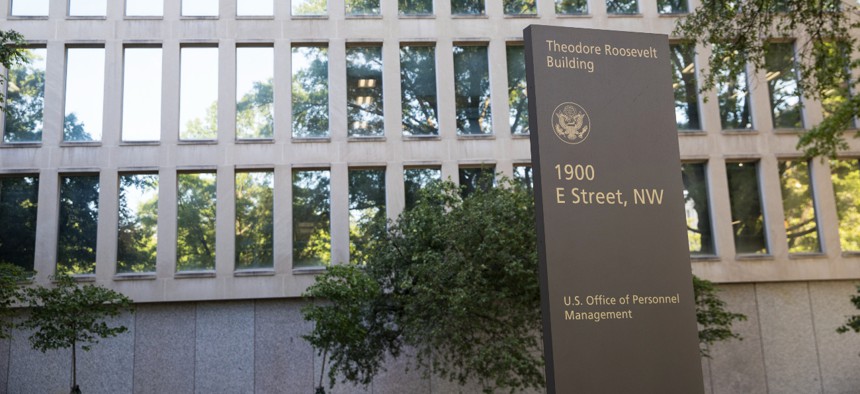
Final regulations are set to be published in the Federal Register on Thursday. Sarah Silbiger for The Washington Post via Getty Images
OPM Finalizes Rules Rescinding Provisions of Trump’s Firing Executive Order
The new regulations follow through on a 2021 executive order signed by President Biden rescinding several of the Trump administration’s personnel policies.
The Office of Personnel Management is set to publish final rules Thursday that will rescind policies established during the Trump administration aimed at making it easier to fire federal workers.
In 2018, then-President Trump signed an executive order streamlining the discipline and removal of federal employees. OPM in November 2020 issued regulations to implement the edict, including requiring agencies to reform supervisors when the end of an employee’s one-year probationary period is three months and one month away, and clarified that agencies are not required to help underperforming employees to improve or provide a performance improvement longer than 30 days.
The 2020 rules also shortened the timeframe by which employees were able to respond to allegations of misconduct or poor performance before adverse personnel actions were formally proposed, and barred agencies from agencies to settlements with employees, where the workers agree to resign in exchanged for having adverse personnel actions stripped from their employment records.
Shortly after taking office in January 2021, President Biden issued an executive order rescinding the 2018 directive underpinning the regulations and establishing new policies focused on “protecting” the federal workforce and setting the goal for the federal government to be a “model employer.” And in January 2022, OPM first proposed regulations to restore federal rules to the status quo prior to the 2020 update.
In that filing, OPM noted that one particularly problematic provision of the Trump-era policy was that barring agencies from entering into settlement agreements with employees accused of poor performance or misconduct, because it actually increased the likelihood that employees would engage in costly litigation with their former employers.
“Due to continued objections raised since the publication of the Nov. 16, 2020, final rule, OPM believes that the prohibition of clean record agreements hampers agencies’ ability to resolve informal and formal complaints at an early stage and with minimal costs to the agency,” the proposed regulations state. “Notably, stakeholders have stressed that the prohibition of clean record agreements limits resolution options; reduces the likelihood of parties reaching a mutually agreeable resolution of informal or formal complaints; potentially increases costly litigation and arbitration; and crowds the dockets of third-party investigators, mediators and adjudicators such as the Merit Systems Protection Board, Office of Special Counsel, and Equal Employment Opportunity Commission.”
In final regulations set to be published in the Federal Register Thursday, OPM set the implementation date for its rules implementing Biden’s directive for Dec. 10. The agency said a number of federal employee unions and other organizations applauded the regulations and described the Trump-era rules as “eviscerating federal employees’ rights” and “damaging.”
But some management groups objected to portions of the regulations, with one stating that “where clarity had been provided [with the 2020 rule], it has been replaced with opacity and confusion.” OPM said it disagreed with those characterizations, and argued that it merely replaced new—and thanks to agencies’ collective bargaining obligations prior to implementation, mostly unused—rules with what agencies have been doing for decades.
“We do not believe that the rule is unclear or is difficult to comprehend as these regulatory changes restore well-established principles and practices that are familiar to federal agencies and have proven to be successful tools to support managers in addressing unacceptable performance and promoting employee accountability for performance-based reduction-in-grade, removal actions and adverse actions while recognizing employee rights and protections,” the agency wrote.







